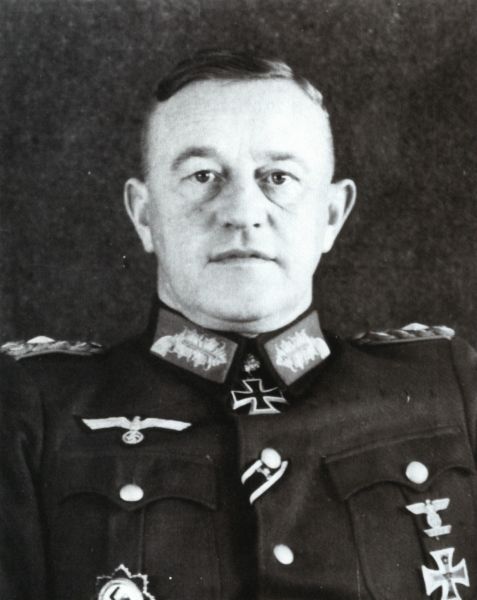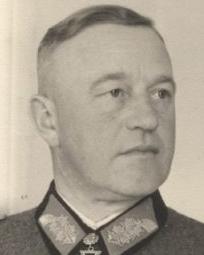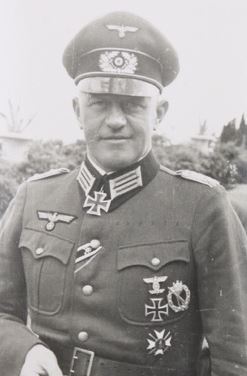Müller, Friedrich-Wilhelm
- Date of birth:
- August 29th, 1897 (Wuppertal-Barmen/Westernphalia, Germany)
- Date of death:
- May 20th, 1947 (Athens, Greece)
- Nationality:
- German
Biography
Friedrich-Wilhelm Müller was executed on 20th May 1947 for warcrimes he was supposed to be guilty of.
Friedrich-Wilhelm Müller began his military career as an infantryman with German 2nd Infantry Regiment in 1915. Later in the same year, he was made a second lieutenant with 266th Regiment. Remaining with the German Army after WW1, he rose through the ranks slowly but steadily, reaching the rank of major in 1936 and lieutenant colonel in 1940. As the commanding officer of 105th Infantry Regiment, he saw action with the Soviets, for which he was awarded the Knight's Cross of the Iron Cross in 1941 and Oak Leaves to his Knight's Cross in 1942. In Aug 1942, he was made the commanding officer of 22nd Air Landing Infantry Division based in Crete, Greece. He was responsible for many acts of atrocity against Greek civilians, including the massacres at Viannos, Anogia, Amari, and Damasta, as well as for the execution of prisoners of war against over 100 Italian officers on the island of Kos. In 1943, at the rank of Generalleutnant, he was made the commanding officer of 22nd Infantry Division. In Jul 1944, he was made the commanding officer of all occupation forces on Crete. In 1945, he returned to the Eastern Front at the helm of German 4th Army. He was captured by the Soviets at the end of the war in Ostpreußen (East Prussia), Germany. He was tried by a Greek court for war crimes in 1946. Found guilty, the "Butcher of Crete" was sentenced to death by firing squad, and the sentence was carried out in May 1947.
Do you have more information about this person? Inform us!
- Period:
- Second World War (1939-1945)
- Awarded on:
- December 22nd, 1939
Had already received the Iron Cross 2nd Class on 25th May 1916.
- Period:
- Second World War (1939-1945)
- Awarded on:
- June 12th, 1940
Had already received the Iron Cross 1st Class on 29th August 1916.
- Period:
- Second World War (1939-1945)
- Rank:
- Oberstleutnant (Lieutenant-colonel)
- Unit:
- Kommandeur Infanterie-Regiment 105 / 72.Infanterie-Division / LIV.Armee-Korps / 11. Armee / Heeresgruppe Süd
- Awarded on:
- September 22nd, 1941
521st Award.
- Period:
- Second World War (1939-1945)
- Awarded on:
- January 19th, 1942
- Period:
- Second World War (1939-1945)
- Rank:
- Oberst
- Unit:
- Kommandeur Infanterie-Regiment 105 / 72.Infanterie-Division / XXX.Armee-Korps / 11.Armee
- Awarded on:
- April 8th, 1942
86th Award.
- Period:
- Second World War (1939-1945)
- Rank:
- Generalleutnant
- Unit:
- Kommandeur 22.Infanterie-Division
- Awarded on:
- June 18th, 1943
Award 394/20.
- Period:
- Second World War (1939-1945)
- Awarded on:
- November 18th, 1943
- Period:
- Second World War (1939-1945)
- Rank:
- General der Infanterie
- Unit:
- Kommandierender General LXVIII.Armee-Korps
- Awarded on:
- January 27th, 1945
128th Award.
- Period:
- Second World War (1939-1945)
- Awarded on:
- March 10th, 1945
- Period:
- Second World War (1939-1945)
- Awarded on:
- March 30th, 1945
- Period:
- Second World War (1939-1945)
- Period:
- Second World War (1939-1945)
- Awarded on:
- May 25th, 1916
- Period:
- Second World War (1939-1945)
- Awarded on:
- August 29th, 1916
- Period:
- Second World War (1939-1945)
- Period:
- Second World War (1939-1945)
- Period:
- Second World War (1939-1945)
- Period:
- Second World War (1939-1945)
- Period:
- Second World War (1939-1945)
- Period:
- Second World War (1939-1945)
- Period:
- Second World War (1939-1945)
- Period:
- Second World War (1939-1945)
- Period:
- Second World War (1939-1945)
- Period:
- Second World War (1939-1945)
- Period:
- Second World War (1939-1945)
- Period:
- Second World War (1939-1945)
- Period:
- Second World War (1939-1945)
- Period:
- Second World War (1939-1945)
- Period:
- Second World War (1939-1945)
- Period:
- Second World War (1939-1945)
- Period:
- Second World War (1939-1945)
Sources
- Photo 1: Wehrkundearchiv
- - FELLGIEBEL, W.P., Elite of theThird Reich, Helion & Company Limited, Solihull, 2003.
- PATZWALL, K. & SCHERZER, V., Das Deutsche Kreuz 1941-1945, Band II, Verlag Klaus D. Patzwall, Norderstedt, 2001.
- THOMAS, FRANZ & WEGMANN, GüNTER, Die Eichenlaubträger 1940-1945, Biblio-Verlag, 1998.
- Die Ordensträger der Deutschen Wehrmacht (CD), VMD-Verlag GmbH, Osnabrück, 2002
- Kwasny A., Kwasny G., Die Eichenlaubträger 1940-1945 (CD), Deutsches Wehrkundearchiv, Lage-Waddenhausen, 2001
- Axis History Biographical Research via Axis History Forum
































